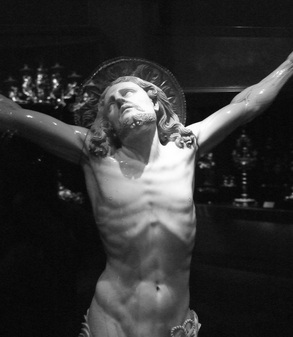Peter Is the ‘Good Guy’
It’s far less painful to identify with Peter, because even when we recognize his faults in ourselves they somehow seem more forgivable.
He opened his mouth so often without thinking, and once Christ had to severely rebuke him: “Get behind me, Satan!” (Matthew 16:23). Peter promised never to desert his Master, shortly before denying Him three times with loud curses.
We secretly suspect we’d have reacted just like Peter in the same situation. Peter is the guy with a good heart who sometimes gets it wrong.
The Loner
We don’t hear much about Judas during Jesus’ ministry. He never engaged with Jesus or the apostles, possibly because of his stealing. We discover this about him when Lazarus’ sister Mary anoints Jesus’ feet with extremely expensive oil.
Judas pretends to be outraged, saying that the ‘genuine aromatic nard’ should have been sold to give money to the poor. However ‘he said this not because he cared about the poor but because he was a thief and held the money bag and used to steal the contributions’ (John 12:6).
Such behavior would not have made him popular with his fellow apostles. So he was an outsider who didn’t belong to the group.
Ripe for Satan
If only he had asked Jesus for forgiveness and healing, Jesus would have freely given them. But Judas had no humility, unlike Peter, and kept sinning at a proud distance from Jesus’ Merciful Heart.
He did not love Our Lord or his neighbor. Instead of feeling a reverence for the Eucharist when he received Christ’s Body at the Last Supper, he was apathetic towards Jesus.
Satan has a field day with us when we are lukewarm about our faith and filled Judas’ heart so effortlessly: ‘After Judas took the morsel, Satan entered him’ (John 13:27).
Judas then rose, leaving the very first Mass early in order to betray Jesus. How often have we done the same thing to Our Lord?
When Judas realizes that Jesus is being condemned to death, he is “filled with remorse” (Matthew 27:3). He understands that he has “betrayed an innocent man” (Matthew 27:4) and tries to return the thirty pieces of silver to the chief priests and elders. But they laugh in his face.
All he needed to do was ask Jesus for forgiveness. But he continued to separate himself from Christ’s love, too proud and steeped in the habit of sinning to see his way out of the darkness towards the light of Christ.
He’d seen so many sinners be forgiven, yet remained blind to the truth that such forgiveness was available to him, too! An eye witness to so many miracles, he still had no faith.
Instead, he despaired – the ultimate sin – and committed suicide by hanging himself.
Imagine the different ending to this story if he had asked Jesus to forgive him! Judas would have been the greatest example in history of God’s mercy. What a wasted opportunity!
If the man who betrayed Jesus had only asked his crucified Lord for forgiveness, Judas would have been the greatest saint who ever repented and reformed.
But Judas’ years of estrangement from Our Lord and habitual sin had made him too proud to ask God for mercy. He allowed Satan to discourage him from believing that he could be forgiven.
We must always believe that we can be forgiven – no matter what we’ve done.
Peter also wept with bitter remorse, when his eyes met Jesus’ as the cock crowed immediately after his three denials of Christ.
But he didn’t go off alone and hang himself. Instead he felt very humbled when he saw himself for the sinner he was.
Christ met Peter in private after his resurrection (Luke 24:34). We don’t know what was said, but we can imagine that Peter begged Jesus for forgiveness. He would have instantly received it.
Then Jesus publicly restored Peter's standing. He asked him three times if he loved Him and gave Peter the chance to say he did. Here is a great commentary on this Bible passage: Simon Peter, Do You Love Me?
Peter was restored to life in Christ because he didn’t despair, and believed in His Infinite Mercy.
This Easter we need to ask ourselves - are we Peter or Judas? Do we understand that Christ died a horrible death to save all of us? Or do we believe that we're so special that God’s mercy doesn’t apply to us, which is a form of pride?
Rather than despair when we fall, we must believe in Christ’s Mercy at all times.
Jesus, I Trust in You!






 RSS Feed
RSS Feed